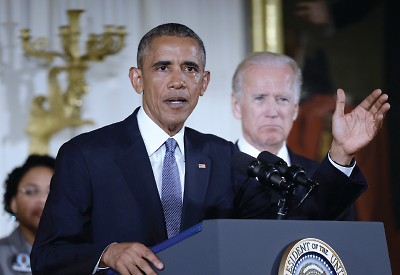Obama Takes Action to Cut Gun Violence, Boost MH Access
Abstract
The president announced his plan to reduce firarms violence while surrounded by the families of gun victims and gun control activists.
President Barack Obama announced several executive actions early in January intended to reduce gun violence, including an additional $500 million to increase access to mental health treatment.

In an emotion-laden press conference last month at the White House, President Barack Obama announces a series of executive actions intended to expand background checks for some firearm purchases, step up federal enforcement of the nation’s gun laws, and increase access to mental health care.
“While individuals with mental illness are more likely to be victims of violence than perpetrators, incidents of violence continue to highlight a crisis in America’s mental health system,” said the president in an accompanying statement.
Other provisions called for expanding background checks for gun purchasers, upgrading the background check system, improving enforcement of existing gun laws, and promoting research on gun-safety technology.
Such “common sense” measures have been repeatedly blocked in Congress, said the president.
“Excuses no longer suffice,” he continued. “The time has come not to debate the last mass shooting but to prevent the next one.”
The president was introduced at the White House event by Mark Barden, the father of Daniel Barden, who was killed in the mass shooting at Sandy Hook Elementary School in Newtown, Conn., in 2012. Surrounding the president were people who were either family members of victims of gun violence or victims themselves.
“Gun violence is a public health problem and needs to be addressed as such,” said APA President Renée Binder, M.D., in a statement. “We welcome the announcement from President Obama to make needed investments in mental health and curb the epidemic of gun violence in our country.”
The administration also issued a final rule governing the Health Insurance Portability and Accountability Act of 1996 (HIPAA) to permit certain hospitals and state agencies—but not clinicians—to report individuals under specific circumstances to the National Instant Criminal Background Check System (NICS).
In a letter to members of APA’s Board of Trustees and Assembly, APA CEO and Medical Director Saul Levin, M.D., M.P.A., said: “It is APA’s sense that the final HIPAA/NICS rule released today is well balanced and addresses our previously articulated major concern regarding the need to preserve privacy, incentivize treatment, and prevent any federal law or regulation that ... would require or permit psychiatrists to report their patients directly to NICS or any other federal database.”
Less clear at present are the implications of a proposal to include in the background check system information from the Social Security Administration (SSA) about individuals “who have a documented mental health issue, receive disability benefits, and are unable to manage those benefits because of their mental impairment or who have been found by a state or federal court to be legally incompetent.”
APA’s formal position on the use of such information awaits the release of rules to be issued by the SSA. However, the proposal has raised concern from one forensic psychiatrist.
“There is no evidence that this group of people is at any higher risk of violence,” said Liza Gold, M.D., a clinical professor of psychiatry at the Georgetown University School of Medicine in Washington, D.C., and co-editor of the new book Gun Violence and Mental Illness from American Psychiatric Association Publishing.
Gold applauded the president’s commitment to allocate more funds for mental health care. However, lumping all people with mental illness into one category and assuming they are dangerous is a problem, she said in an interview.
“This unfortunately perpetuates the widespread misperception that people with serious mental illness are violent and are responsible for the problem of gun violence,” said Gold. “I believe that mental health prohibitions to owning firearms should be based on research evidence demonstrating increased risk. These prohibitions don’t do what they are supposed to do, and they only reinforce stigma and negative stereotypes.”
The president has included funds for such research in his recent budget proposals, but Congress, pressured by the gun lobby, has refused to allocate the money.
Overturning the congressional ban on firearms injury research by the Centers for Disease Control and Prevention is “desperately needed,” but that has proved politically difficult, said Gold. ■
A fact sheet on Obama’s executive actions can be accessed here. The final HIPAA rule is available here. APA members may purchase Gun Violence and Mental Illness at a discount.



